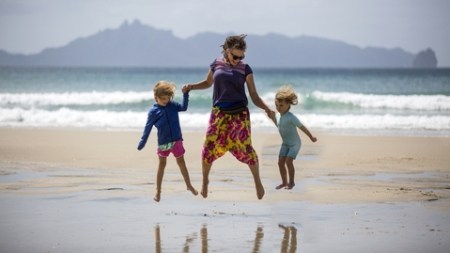When School Isn’t “FINE”: Emotion Coaching Helps A Son Open Up To His Mum

October 26, 2018
By Presbyterian Support New Zealand
Like many mums, Maggie used to ask her son Davis (7) how his day was and receive the one-word answer “fine“. Then one day she discovered he was being bullied.
At school Davis was working with Family Works social worker Kate Jones to help him manage difficult emotions around worry and anxiety. In his mum’s words “he was very sensitive, getting upset over the slightest thing” and pulling out his eyebrows and eye lashes. When Maggie talked to Kate about not knowing Davis was being bullied, Kate suggested Maggie try emotion coaching to help support their connection and communication, and she referred Maggie to the Tuning in to Kids programme. “Kate thought emotion coaching might encourage Davis to open up more about things that were bothering him,” said Maggie.
Maggie was intrigued about Tuning in to Kids and about going to a parenting course in general.
“I’d always been told ‘there’s no book on parenting’,” said Maggie. “And I believed it, because everyone is different so I figured there’s no right answer”.
Emotionally intelligent children enjoy increased self-confidence, greater physical health, better performance in school, and healthier social relationships. Several times a year, Family Works offers Canterbury parents the opportunity to attend the parenting programme, Tuning in to Kids. Tuning in to Kids is a 6-session course that teaches parents skills in emotion coaching, which is to recognise, understand and respond to children’s emotions in an accepting, supportive way,. This approach helps children to become emotionally intelligent, i.e., to understand and manage their emotions. Tuning in to Kids is an international programme based on the research of renowned psychologist Dr John Gottman. TIK has been proven to improve parenting, parent-child relationships, children’s emotional competence, and behaviour. If you would like to learn more, please contact Janice Huddy in Christchurch at 03 363 8214 or janiceh@psusi.org.nz.
There’s Something for Everyone at Tuning in to Kids
“The parents on the course were mixed,” said Maggie. “Some were similar to me, while others had very different things going on.” But Maggie appreciated being able to share experiences with the other parents and find they understood how she felt. “The course seemed to have something for everyone,” she said. “Even if a particular topic didn’t feel a hundred percent relevant to me, I would see it resonating with others in the group.”
Maggie’s own learning highlight was finding out how to ask Davis about sensitive topics indirectly. “I get more information by easing him into a topic instead of asking directly,” said Maggie. “Tuning in to Kids taught me how to approach a subject using the right words. I learnt to think about how to approach a situation before speaking.”
Maggie learnt this was especially true when children don’t want to talk or are emotional. “When Davis is angry, instead of immediately telling him to explain himself, I now give him time to cool down first. Actually, everyone needs that when they’re emotional or angry—even I do—we all just need time.”
Setting Boundaries while Supporting Emotions
Another key learning for Maggie was how to set boundaries around behaviour while still supporting Davis’ emotions. “Even when you’re using techniques from the course, there is still a behavioural line the child shouldn’t cross,” she says. “Recognising that boundary is important because then I can sit Davis down and ask him to take responsibility for himself.”
Maggie also feels confident identifying when a boundary is required and when it’s not. For example, she can usually tell when Davis is being defiant versus just hungry, sick, or tired.
An Ongoing Shift
Thanks to Maggie’s new emotion coaching skills, Davis opens up to his mum more now. And sometimes even volunteers information without her asking. “I had to find the right approach for Davis, and the Tuning in to Kids course helped me do that,” said Maggie. “It’s definitely good information and helpful, and a great thing to carry on with,” said Maggie.
The effects of emotion coaching on Maggie and Davis’ relation were clearly visible to Kate. “When I first met Maggie and Davis together, I could see they were close and shared a pretty strong connection,” says Kate. “However, by our last session, Maggie had shared that they were spending more time together and I could observe that Maggie’s approach to Davis had really strengthened their relationship.”
Kate’s work with Davis at his school has also had an effect on his wellbeing. “Davis is more chipper at school and has fewer issues in class.” said Maggie. “I think it’s a mixture of his getting the help he needs and my taking the Tuning in to Kids course.”
“<Emotion Coaching parents> don’t object to their children’s displays of anger, sadness, or fear. Nor do they ignore them. Instead, they accept negative emotions as a fact of life and they use emotional moments as opportunities for teaching their kids important life lessonsand building closer relationships with them.”
― John M. Gottman, Raising an Emotionally Intelligent Child
*Real names have been changed.
This article was originally published on http://psuppersouth.org.nz/when-school-isnt-fine-emotion-coaching-helps-a-son-open-up-to-his-mum
